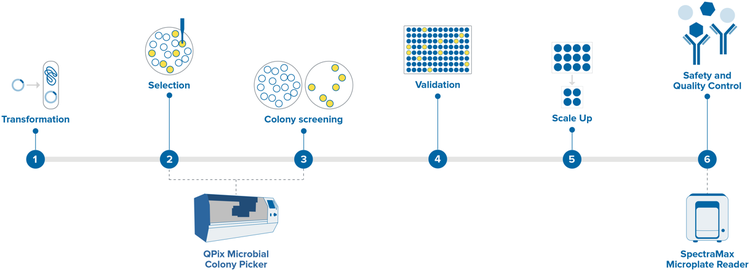
Precision Fermentation
Scale up food production for plant-based meat alternatives and animal-free proteins using synthetic biology techniques
Precision fermentation
Cellular agriculture allows us to produce genuine animal proteins through microbial precision fermentation. Using synthetic biology techniques like strain engineering, scientists can engineer microbial cells as cellular factories for various organic molecules, most commonly proteins. In the food supply chain, precision fermentation is used to create everything from plant-based proteins from yeast cells to dairy- and animal-free whey protein from fungal strains.
For strain engineering to be the most efficient, automation can replace manual colony screening and selection processes in the workflow. Selecting large numbers of high performing microbial colonies is essential to scale up a food product created with precision fermentation.

Automate synthetic biology workflow for strain engineering
Due to the high throughput nature of microbial strain engineering, molecular cloning workflows are prone to human error, labor-intensive, and time consuming. These challenges create large bottlenecks resulting in low productivity. Strain engineering can benefit greatly from the increased productivity of an automated colony picker such as Molecular Devices QPix® 400 Series Microbial Colony Picker, which automatically picks up to 3000 colonies per hour or 30,000 colonies per day with automatic pick run data tracking and database management. For higher throughput and more walkaway time, there are custom design options for an automated work-cell that integrates user desired instrumentation, and robotic control with the QPix colony picker to improve productivity and eliminate bottlenecks.

Learn more about our research methods
Here, we highlight various applications and research methods using our QPIX Microbial Colony Picker and SpectraMax® microplate reader to help scale your synthetic biology workflow.